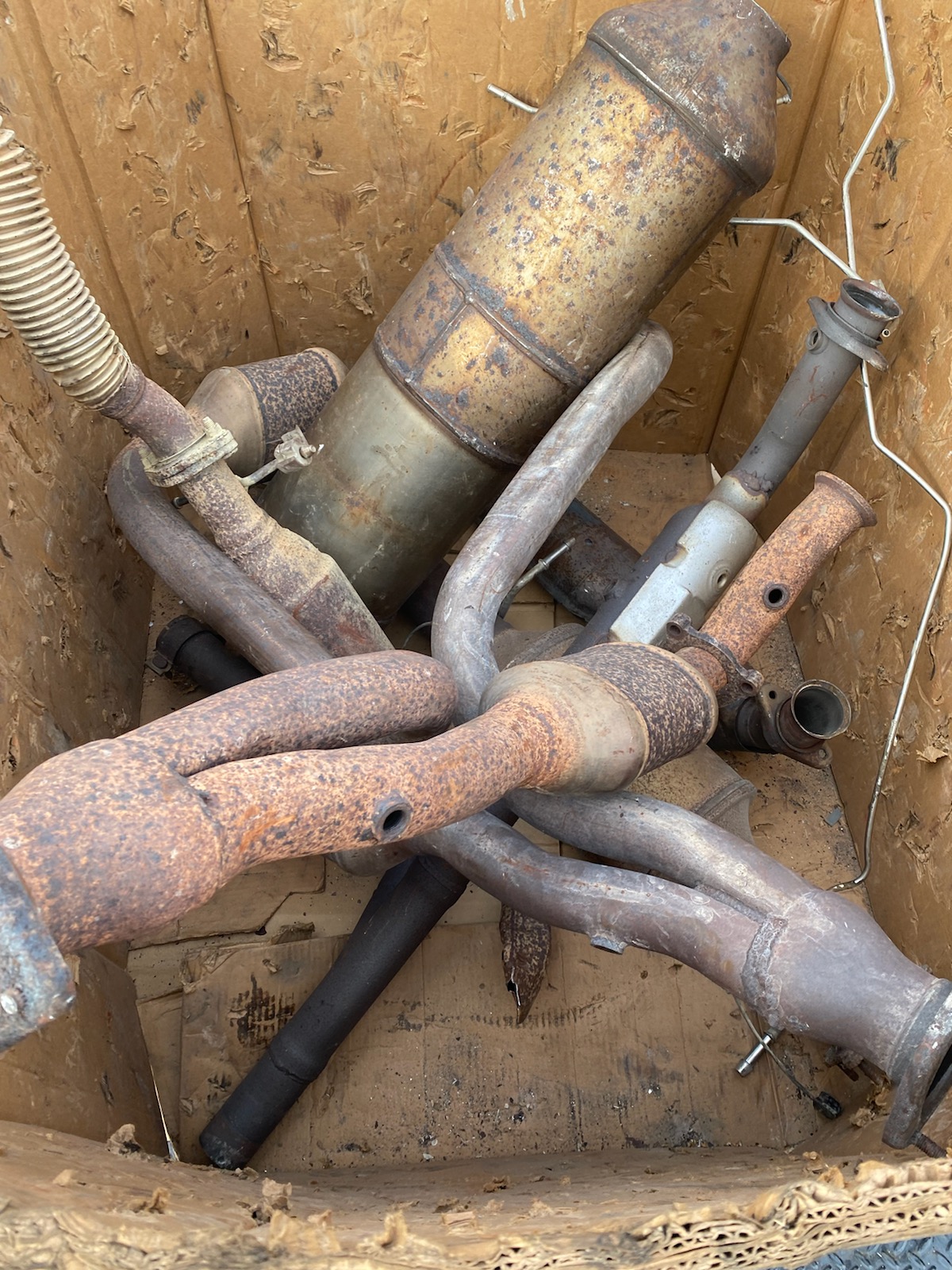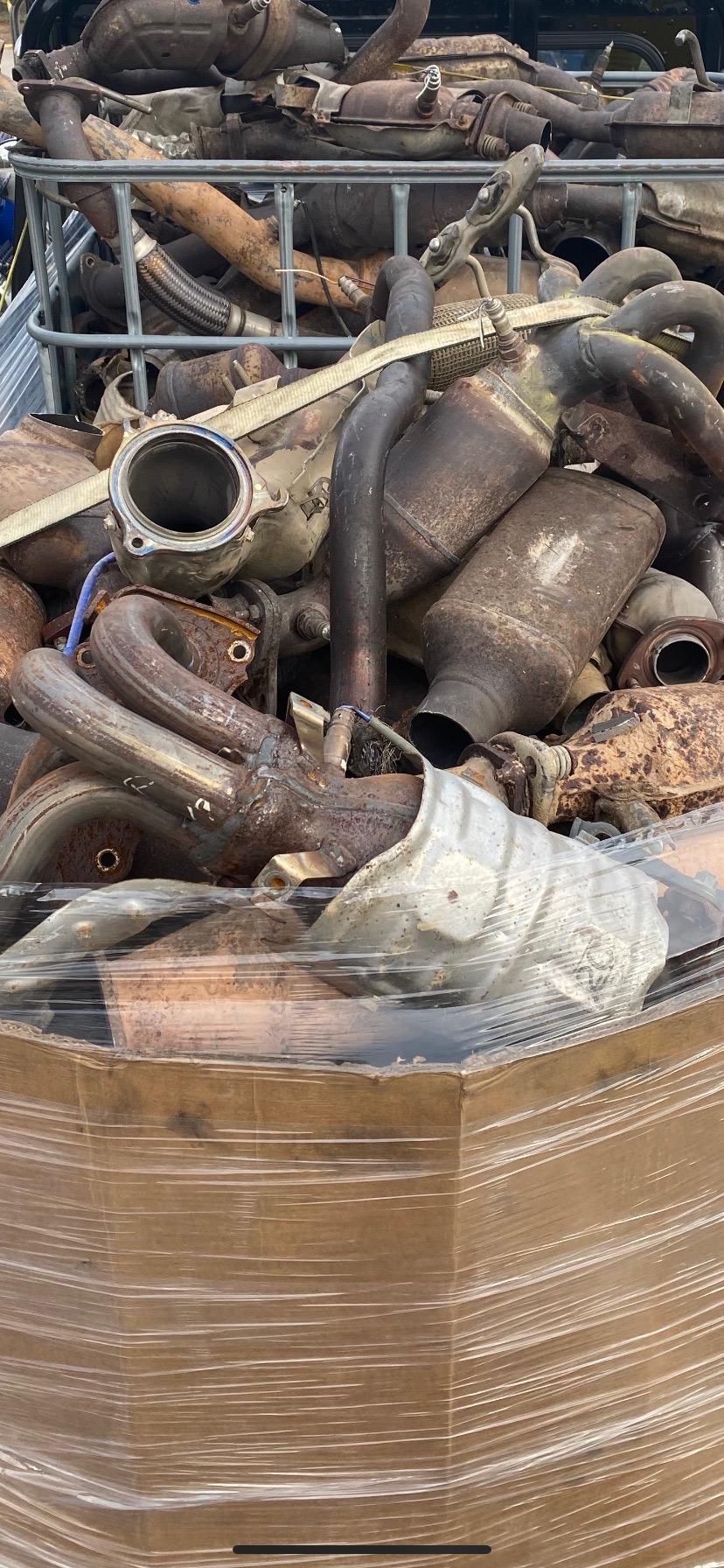Archived Content
In an effort to keep ICE.gov current, the archive contains content from a previous administration or is otherwise outdated. This information is archived and not reflective of current practice.
HSI, law enforcement partner investigation results in sentencing of 3 defendants for scheme to transport stolen catalytic converters across state lines
SPRINGFIELD, Mo. — Three Missouri men have been sentenced in federal court for their roles in a scheme to transport tens of thousands of stolen catalytic converters across state lines as part of a multimillion-dollar business following a Homeland Security Investigations (HSI) and law enforcement partner investigation.
Evan Marshall, 25, of Rogersville; Cody Ryder, 31, of Springfield; and Camren Joseph Davis, 25, of Rogersville, were sentenced by U.S. District Judge M. Douglas Harpool, Dec. 19.
“These three defendants were the ringleaders of a scheme that impacted thousands of area residents,” said U.S. Attorney Teresa Moore. “We worked closely with a number of our law enforcement partners to shut down their multimillion-dollar operation and bring the perpetrators to justice.”
Marshall was sentenced to five years and 10 months in federal prison without parole. The court also imposed a $750,000 judgment against Marshall to be forfeited to the government, ordered Marshall to pay $19,133 in restitution to victims of the conspiracy law enforcement were able to identify, and forfeiture to the government of the following items that were seized by law enforcement: 33 rifles; 20 scopes; six shotguns; 26 handguns; a Glock sub conversion kit; eight ammunition magazines; a 2011 Dodge Ram 3500 one-ton pickup truck; a 2004 Dodge Ram pickup truck, a flatbed trailer; two 42-foot gooseneck flatbed trailers; a 16-foot livestock trailer; a 2021 Load N’ Go utility trailer; a 2007 car hauler trailer; a Volkswagen dune buggy; two Harley-Davidson motorcycles; a 2012 Keystone fifth-wheel camper; a Caterpillar skid steer; a 2019 Honda Talon SXS 1000 side-by-side; a 2016 Polaris RZR side-by-side; a Polaris Ranger 4x4; and 191 catalytic converters.
Ryder was sentenced to two years and five months in federal prison without parole. Davis was sentenced to five years of probation. The court imposed financial judgments against Ryder and Davis, ordering them each to forfeit $125,000 to the government.
“We are pleased to be a part of, and to see the successful ending to, this long-term investigation,” said Springfield Police Chief Paul Williams. “It is good to see the main participants in this crime being held accountable and the potential for restitution for victims in our community.”
On June 16, Marshall pleaded guilty to one count of transporting stolen property across state lines. Ryder pleaded guilty on June 13, and Davis pleaded guilty on April 21, to their roles in a conspiracy to transport stolen property across state lines.
Co-defendants Enx Khoshaba, 30, Leslie Ice, 38, and Eric Kaltenbach, 38, all of Springfield, and Danielle Ice, 34, of Columbia (formerly of Springfield), pleaded guilty to their roles in the conspiracy to transport stolen property across state lines and await sentencing.
Marshall admitted that he transported stolen catalytic converters valued at $1 million or more across state lines from December 2019 to October 2021. Marshall also admitted that he bought tens of thousands of stolen catalytic converters directly from his co-defendants and other thieves and sold the stolen catalytic converters for approximately $1 million.
Marshall began selling the catalytic converters to a company in Mountain Home, Arkansas, in the fall of 2019. At that time, Marshall purchased junk vehicles and sold their parts, including catalytic converters. In fall 2019, the owners of the Mountain Home company asked Marshall if he would begin purchasing catalytic converters in southwest Missouri and sell exclusively to them. Marshall agreed; in return, they regularly provided Marshall with cash to purchase a higher volume of catalytic converters. They also provided Marshall with a list of valuable catalytic converters. By December 2019, Marshall had mostly stopped buying junk vehicles and scrapping them out for parts, instead purchasing already-detached catalytic converters from scrap yards and individual sellers.
By January 2020, the Mountain Home company’s owners were wiring Marshall hundreds of thousands of dollars monthly so he could purchase a higher volume of detached catalytic converters.
By December 2019, Marshall enlisted Davis to work for him and another company, which Marshall also established in December 2019. Davis’ job was to purchase catalytic converters using cash that Marshall provided him. During that time, Marshall provided Davis with hundreds of thousands of dollars in cash to purchase catalytic converters on Marshall’s behalf. As part of the arrangement, Davis exclusively sold the catalytic converters to Marshall. On at least one occasion, Marshall provided Davis with $40,000 in cash for the purchase of catalytic converters.
Davis admitted that he bought at least 1,500 stolen catalytic converters from various thieves and sold them to Marshall for a total of approximately $250,000.
In February 2021, Marshall enlisted Ryder to work for him and his company. As with Davis, Ryder’s job was to purchase catalytic converters using cash that Marshall provided him. From February 2021 through October 2021, Marshall provided Ryder with hundreds of thousands of dollars in cash to purchase catalytic converters on Marshall’s behalf. As part of the arrangement, Ryder exclusively sold the catalytic converters he purchased to Marshall. On at least one occasion, Marshall provided Ryder with $10,000 in cash for the purchase of catalytic converters.
Ryder admitted that he bought at least 1,500 stolen catalytic converters from thieves and sold them to Marshall for an aggregate amount of approximately $250,000.
Marshall knew that many of the catalytic converters that Davis and Ryder purchased were stolen. He paid them an agreed-upon percentage amount, over their purchase price and less the amount of cash he gave them to purchase the parts.
From December 2019 through October 2021, in addition to utilizing Davis and Ryder as buyers, Marshall also purchased stolen catalytic converters directly from thieves. In July 2020, a Springfield police detective contacted Marshall regarding purchases from known thieves. Despite being put on notice that he was purchasing stolen catalytic converters, Marshall continued to purchase them from at least one of the individuals the detective identified.
Marshall admitted that he knowingly purchased stolen catalytic converters from co-defendants Davis, Ryder, Ice, Kaltenbach, Khoshaba and at least six other thieves. Marshall transported and sold almost all the catalytic converters, including those that were stolen, to the Mountain Home business’ owners.
Marshall, Davis, Ryder, and others loaded the catalytic converters into bins placed on trailers at Marshall’s residence. They hauled the trailers, which each contained between 800 and 1,200 catalytic converters, from Rogersville to Mountain Home. Marshall transported catalytic converters from Rogersville to Mountain Home approximately every two weeks from December 2019 through October 2021.
This case is being prosecuted by Assistant U.S. Attorneys Shannon T. Kempf and Anthony Brown. It was investigated by HSI; the Springfield Police Department; IRS-Criminal Investigation; the Bureau of Alcohol, Tobacco, Firearms and Explosives; the Drug Enforcement Administration; the Missouri State Highway Patrol; the Christian County Sheriff’s Department; the Webster County Sheriff’s Department; the Missouri Department of Revenue and the Greene County prosecuting attorney.
Organized Crime Drug Enforcement Task Forces
This effort is part of an Organized Crime Drug Enforcement Task Forces (OCDETF) operation. OCDETF identifies, disrupts, and dismantles the highest-level criminal organizations that threaten the United States using a prosecutor-led, intelligence-driven, multi-agency approach. Additional information about the OCDETF Program can be found at justice.gov/OCDETF.
Homeland Security Investigations (HSI)
HSI is a directorate of U.S. Immigration and Customs Enforcement (ICE) and the principal investigative arm of the U.S. Department of Homeland Security (DHS), responsible for investigating transnational crime and threats, specifically those criminal organizations that exploit the global infrastructure through which international trade, travel, and finance move. HSI’s workforce of over 10,400 employees consists of more than 6,800 special agents assigned to 225 cities throughout the United States, and 93 overseas locations in 56 countries. HSI’s international presence represents DHS’s largest investigative law enforcement presence abroad and one of the largest international footprints in U.S. law enforcement.
Learn more about HSI’s mission to combat organized crime in your community on Twitter @HSIKansasCity.



